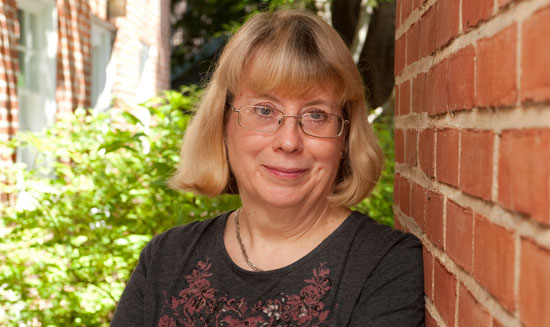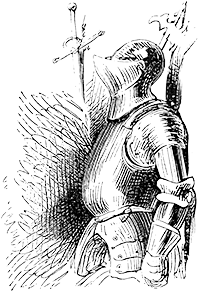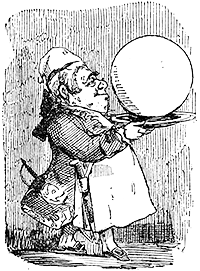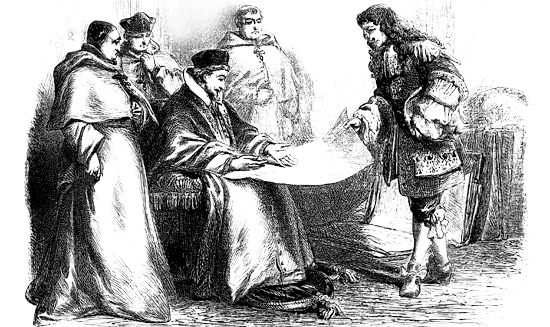


The people who lived during the Middle Ages (5th – 15th centuries) didn't believe the Earth was flat. In fact, as UD philosophy professor Kate Rogers tells us, the medievals were a lot more hip about the world, and science, than you might think...
 he great philosopher Socrates was sentenced to death for, among other things, telling young folks they can't believe everything they hear. Part of my job as a medievalist is getting this sad fact — well, actually both sad facts — across to my students.
he great philosopher Socrates was sentenced to death for, among other things, telling young folks they can't believe everything they hear. Part of my job as a medievalist is getting this sad fact — well, actually both sad facts — across to my students.
In the last 500 years, the brilliant ad agency doing PR for the so-called Renaissance, Enlightenment and Age of Reason has sold us such a bill of goods concerning the Middle Ages that the misperception of this period is almost ubiquitous, even today. It has to stop!
Here, I list, and bust, three (among many) common myths about what people in Western Europe thought in the Middle Ages.


Now, we don't know what farmer John or Hilda, the potter's wife, thought about the shape of the Earth. However, among the educated— at least later in the period, from the 9th century on — it was generally known that the Earth is round. Aristotle had said it, and there's plenty of evidence from observation. Well before Columbus set sail, they had calculated the Earth's circumference to within about two miles.
Nobody said to Columbus, "Don't sail west in those little boats. The Earth is flat and you'll fall off the edge." What they said was, "Don't sail west in those little boats. The Earth is big, and you won't make it to China."
Nothing against Columbus. He was a brave man and a brilliant sailor, but he was just darn lucky there was a big, fat continent in between Lisbon and Shanghai.
It's true that medieval folks believed the Earth to be at the center of the universe. Aristotle had said that, too. Some people say the reason why our medieval ancestors placed the Earth center stage is because they thought human beings were the most important creatures in the world.
But no. Our medieval ancestors put Earth at the center because that's how it appears when you look up into the heavens at night. They also thought the world outside the sphere of the moon was really much nicer than down here where things fall apart and die. They did think (Silly old them!) that human beings were among the most valuable creatures. Fond as we may be of Brother Squirrel and Cousin Oak, human beings are cooler in that we are rational agents.

Au contraire! The universe is made by God, and in the words of the foundational architect of western medieval thought, St. Augustine of Hippo (354–430 A.D.), "All that you [God] have made is good… And because you did not make them all equal, each single thing is good and collectively they are very good, for our God made his whole creation very good."
The medievals did believe there were more important things about you than your store of scientific information, such as your values and your relationships with other people. But the nature of natural causation was a hot and ongoing topic among medieval thinkers. One major debate, still with us today, is this: Does observation justify belief in necessary causal connections between objects, or only in a consistent pattern of behavior, which might change or disappear next moment?
And we have our medieval ancestors to thank for science as we know it. Aristotle, who constructed theories based on observation and even carried out the stray experiment, should perhaps be called the "grandfather of modern science." But to have science as the discipline we know today, you need universities where groups of scientists can work together and pass their findings on to their successors.
Albert the Great (1193/1206 –1280), the teacher of Thomas Aquinas (1225–1274), is arguably the first to conduct his scientific research, including the construction of experiments, within the setting of the then pretty new university system of Western Europe. The title of "father of modern science" goes to Albert, and it's been a story of steady progress since his day.


In parts of the medieval Muslim world, you did have theocracy — rule over the state by religious authorities. Unlike Jesus, Mohammed had been a political and military, as well as religious, leader. But in Western Europe, with the possible exception of the small Papal States in the middle of Italy, there was no theocracy. There were no theocratic governments, and there is not a single political philosopher defending theocracy.

There were kings who tried to wrap themselves in the mantle of the Church and probably wished they could run it. And Churchmen tried to exercise authority over the state and likely thought they could do better than the rulers. But Europe in the Middle Ages followed Augustine who had insisted on a separation of Church and State, each with its own job to do.
If you doubt this, have a glance at medieval history. It tells a tale of constant tension between Church and State. Think of St. Thomas Becket (1118–1170), murdered by the king's men!
As I tell my students, now that you know the truth, you must correct people when they spread these old myths. I'm sorry, but with knowledge comes responsibility. Plus, service to the Truth is liberating — at least that's how the medievals saw it.